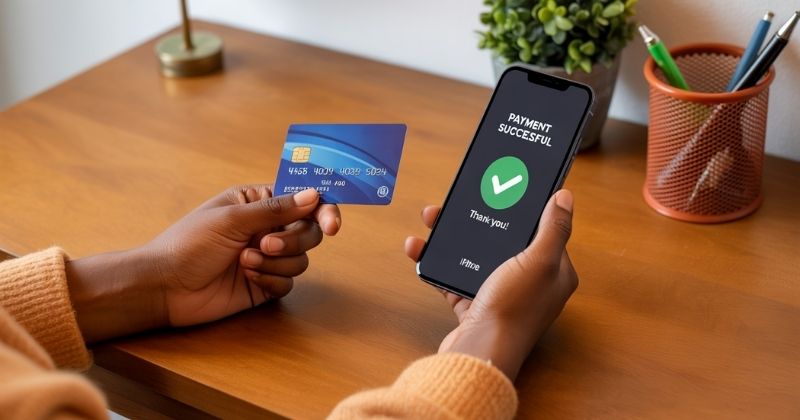
Discovery Bank has raised concerns over the increasing number of fraud cases affecting South Africans, highlighting how criminals are now deliberately focusing on smartphones to gain access to banking applications and digital wallets stored on these devices. This new wave of crime marks a shift from traditional card fraud to more sophisticated digital theft, often leaving victims unaware until large sums have vanished from their accounts.
Key Takeaways
- Smartphones Are Now Prime Targets for Banking Fraud: Criminals are increasingly stealing phones and bypassing security by jailbreaking devices, adding their own biometric data, and accessing digital wallets and banking apps.
- Card-Not-Present Fraud and Mobile Scams Are Surging: Over 80% of card fraud cases in South Africa involve online transactions without physical cards, with losses from card-not-present fraud alone exceeding R338 million.
- Mobile Theft and Poor Blacklisting Fuel Cybercrime: An average of 189 phones are stolen daily, yet only 29% are blacklisted, allowing many stolen devices to remain active and be used in widespread financial fraud.
About Arcadia Finance
Finding the right loan just got easier with Arcadia Finance. Choose from 19 reputable, NCR-compliant lenders and skip the application fees. The process is simple, secure, and designed to meet your financial needs with confidence.
Security Warning to Customers
In an official message issued to its clients on 20 June, Discovery Bank warned that fraudsters are exploiting vulnerabilities in mobile phones to unlawfully access victims’ financial services and accounts.
The message served as a critical reminder that mobile phones, often used without much caution, are now prime targets for criminals who understand how deeply personal and financial lives are connected to these devices.
Once a mobile phone is stolen, cybercriminals are often able to circumvent built-in security systems by using advanced techniques such as decrypting the device or jailbreaking it. After doing so, they can register their own biometric data on the stolen phone, effectively gaining full control over the device. This allows fraudsters to manipulate security software, bypass face and fingerprint locks, and impersonate the legitimate owner without raising immediate red flags.
With the device compromised, criminals are then able to open digital wallets, authorise purchases, or initiate bank transfers, leading to significant financial losses. The bank emphasised that customers should treat their phones with the same level of caution as they would a physical bank card and should take immediate steps if their phone is lost or stolen. The ease with which a stolen phone can be converted into a financial weapon has caught many off-guard, especially those who store banking apps with auto-login enabled.

Recommendations for Personal Protection
Discovery Bank advised clients to use strong, complex PINs and passwords and to avoid using easily guessed information such as birthdates or sequential numbers. They also warned against saving any banking login credentials directly on mobile devices, as this creates a serious risk if the device is ever compromised.
It is also advisable to activate features like remote device wiping and biometric re-authentication to add extra barriers in the event of theft.
Customers were urged to check their bank accounts frequently for any unusual or suspicious transactions. In the event that a phone goes missing, immediate contact with the relevant bank should be made to block access and initiate changes to all financial passwords as a protective measure. Acting within minutes can make the difference between a blocked transaction and thousands of rands lost to a scammer.
Increase in Mobile-Related Fraud
This alert coincides with a notable rise in fraud linked to digital transactions within South Africa. According to the 2025 KnowBe4 African Cybersecurity & Awareness Report, mobile banking and digital financial services have expanded rapidly throughout the continent. The surge in mobile usage has created fertile ground for cybercriminals who exploit gaps in user awareness and outdated security practices.
The report revealed that 95% of survey participants said they use mobile payments or mobile banking platforms. Within South Africa, the figures are even more striking, with half of all respondents stating that they engage in mobile banking regularly. This figure stands significantly above the continental average of 36%. The country’s dependence on mobile banking has outpaced its investment in user education and fraud prevention, leaving a gaping hole in defences.
Although the growing use of digital financial platforms reflects increased access to convenient banking, it has also opened the door for criminals to exploit a wider number of users. With more users comes more data, and for cybercriminals, this means more opportunities to strike across a broader range of income levels.
Banking Security Concerns Among High-Income Users
Discovery Bank’s recently published SpendTrend25 report, which is based on insights from 1,000 South African high-income earners who frequently use credit cards, revealed that public anxiety surrounding financial fraud is increasing rapidly. High earners, often assumed to be more security-savvy, are proving just as vulnerable to digital deception, making them appealing targets.
More than 60% of respondents reported that they are now more concerned about fraud involving digital banking than they were at the same time last year. In addition, 63% disclosed that they had either personally fallen victim to card fraud or knew someone who had.
These figures point to growing distrust in digital financial systems, potentially slowing down future adoption among cautious consumers.
An alarming 76% of those surveyed also indicated that they had received fraudulent messages via email, SMS, or voice calls, further highlighting the extent of phishing attempts and impersonation scams. The sheer volume of these scam messages is overwhelming, often blending into legitimate alerts, making them even harder to detect.

National Card Fraud on the Rise
Statistics from the South African Banking Risk Information Centre (SABRIC) indicate a clear national trend. Card-related fraud increased by 9.1% from 2022 to 2023, with total losses rising from R414 million to R452 million over the period. This growing loss reflects not only the scale of the criminal operations involved but also a struggle among financial institutions to stay ahead of emerging threats.
Online Transactions a Major Target
A significant majority of these cases, accounting for over 80%, involved card-not-present (CNP) fraud. This type of fraud occurs when criminals use stolen card details to carry out online transactions, bypassing the need for physical cards. CNP fraud is particularly difficult to prevent since it often involves purchases on international platforms where additional verification protocols may be weak or absent.
Losses linked to CNP fraud totalled R338.5 million in the reporting period, representing an 18.4% increase compared to the previous year. This illustrates the growing financial damage linked to online banking vulnerabilities. Criminals are increasingly relying on automated tools and stolen data from the dark web to commit these crimes at scale.
In a survey conducted by SABRIC, which gathered feedback from 29 fraud risk experts across nine major banks in South Africa, respondents identified several serious concerns in the realm of financial cybercrime. The responses reveal a sobering reality: even those at the heart of the banking industry are battling to keep pace with the evolution of fraud tactics.
Most Common Fraud Threats
A majority of 52% highlighted authorised push payment (APP) fraud and voice phishing (vishing) as top threats. Meanwhile, 48% pointed to phishing emails and smishing (SMS-based phishing) as major areas of concern.
These scams rely heavily on manipulating human behaviour, proving that even the most advanced security systems cannot protect against social engineering alone.
SIM Swap Fraud Remains a Risk
Another 35% of the professionals surveyed cited SIM swap fraud as a persistent issue. This tactic allows criminals to take control of a victim’s phone number, giving them access to one-time passwords and security calls used in banking authentication processes. SIM swap fraud often bypasses all conventional security protocols, turning the user’s own phone number into a backdoor into their finances.

Escalating Mobile Theft Across South Africa
The rising threat is compounded by a steep increase in mobile phone theft. Data from the South African Police Service (SAPS) shows a sharp rise in reported cases of stolen phones across the country. These stolen phones often end up in illegal resale markets, where they are resold to unsuspecting buyers or hacked and used in financial crimes.
Staggering Theft Figures Reported
An average of 189 mobile phones are stolen every day in South Africa. Between April 2017 and March 2023, a total of 412,998 mobile devices were reported stolen. However, only 29% of these were successfully blacklisted with mobile network operators, limiting the chance of deactivation.
The low blacklist rate allows stolen devices to continue operating, giving criminals the tools they need to launch further attacks.
Gauteng emerged as the province with the highest number of thefts, accounting for 29% of all reported cases. This was followed by the Western Cape at 26%, KwaZulu-Natal at 20%, and the Eastern Cape at 7%. These statistics reveal regional crime hotspots and suggest that coordinated criminal syndicates may be operating in the country’s most populated areas.
More recent data presents an even more concerning picture. Between October 2024 and January 2025 alone, SAPS recovered 116,293 stolen mobile phones, averaging around 1,292 recovered devices each day.
Illegal Market for Stolen Phones Fuelling Fraud
These recovery figures point to the scale of the illicit mobile phone market in South Africa. The prevalence of stolen phones not only reflects a growing theft crisis but also poses a significant threat to mobile banking security, as compromised devices can become powerful tools for financial fraud. Until device security becomes tamper-proof and financial institutions implement stronger safeguards, criminals will continue to exploit these gaps with alarming success.
Conclusion
The rapid growth of mobile banking in South Africa has created new vulnerabilities that criminals are quick to exploit. From SIM swap fraud to device takeovers, the threat landscape is expanding, and many users remain unprepared for the risks. As mobile phones increasingly double as digital wallets and bank cards, they have become lucrative targets for cybercriminals. Without stronger personal security habits and improved industry response, South Africans may continue to face rising losses from mobile-based financial fraud.
Fast, uncomplicated, and trustworthy loan comparisons
At Arcadia Finance, you can compare loan offers from multiple lenders with no obligation and free of charge. Get a clear overview of your options and choose the best deal for you.
Fill out our form today to easily compare interest rates from 19 banks and find the right loan for you.

